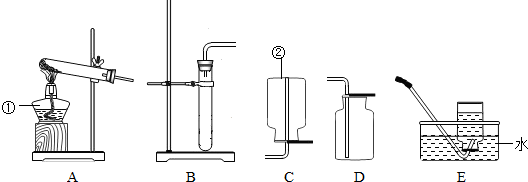中考前,我市各校进行了化学实验操作考查,一些同学用图所示装置制备常见气体.请回答下列问题:

(1)写出图中标号①和②的仪器名称:______、______.
(2)小明用上图B、D装置制取一种常见气体.
①请写出有关反应的化学方程式______.
②检查装置的气密性:先将B装置的导管浸入水中,然后用手握住试管外壁,观察到导管口______(填“有”或“没有”)气泡冒出,表明B装置肯定会漏气.
③如何检验D中的气体已收集满?请写出有关的操作和现象______.
(3)小红同学用A、E装置和高锰酸钾制取并收集气体,要等到有连续稳定气泡冒出时才开始收集,而不是一看到气泡冒出就收集气体,其原因是______.
(1)①是酒精灯,②是集气瓶;
(2)B装置不需要加热,说明反应物有液体,D装置为向上排空气法,说明该气体密度比空气大,常见的有二氧化碳,氧气等,综合考虑,该装置可以是双氧水制氧气,可以是实验室制二氧化碳,反应方程式为2H2O2
2H2O+O2↑或CaCO3+2HCl═CaCl2+H2O+CO2↑;检查气密性时,如果装置漏气,则不会有气体从导管口冒出;如果收集的是氧气,验满应该用带火星的木条放在集气瓶口,木条复燃;如果收集的是二氧化碳,验满应将燃烧着的木条放在集气瓶口,木条熄灭; MnO2 .
(3)不能一开始看到有气泡冒出就收集,应为发生装置中的气体要先排出,否则气体不纯.
故答案为:(1)①酒精灯 ②集气瓶
(2)①2H2O2
2H2O+O2↑或CaCO3+2HCl═CaCl2+H2O+CO2↑ MnO2 .
②没有
③将带火星的木条放在集气瓶口,木条复燃;或将燃烧着的木条放在集气瓶口,木条熄灭(说明:此空要与?处的答案相对应.若不对应,或?处没填写,此空不给分)
(3)刚开始排出的是空气(或防止收集到的气体不纯;或试管中原来有空气等合理答案均可)
